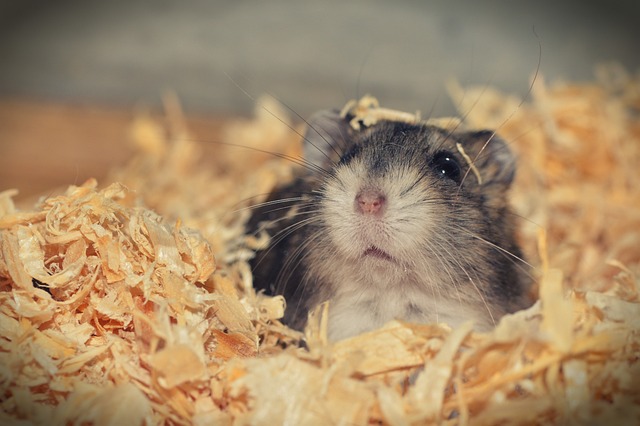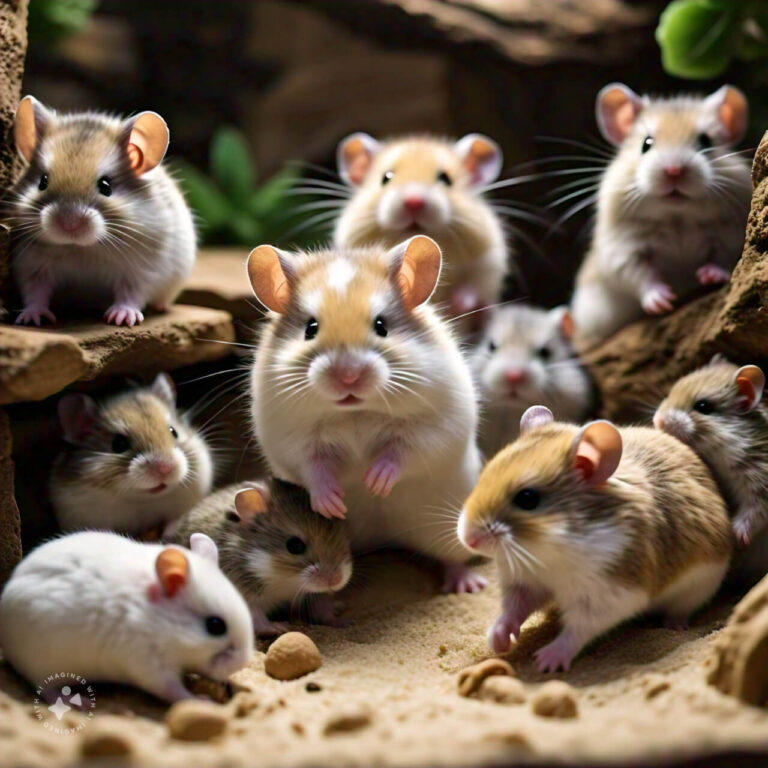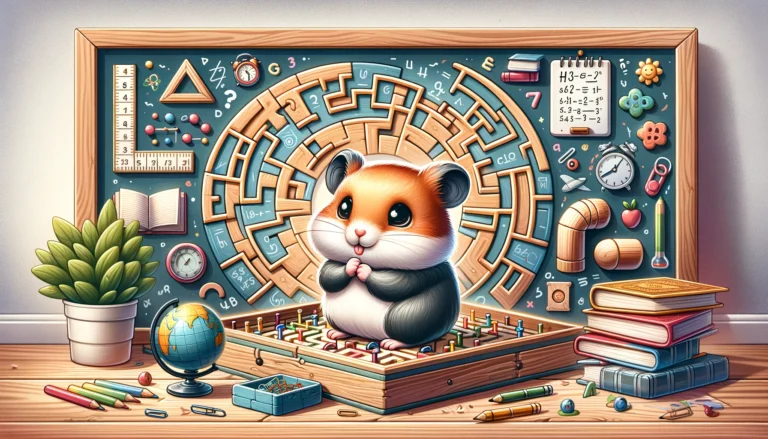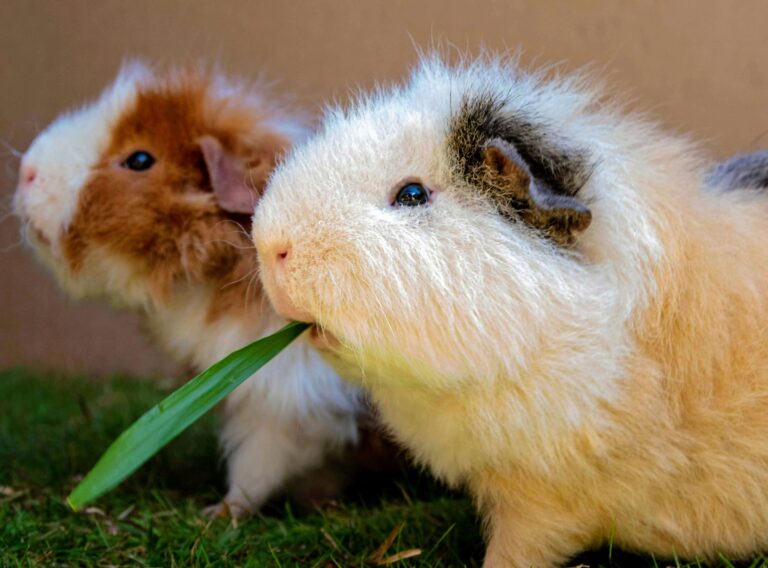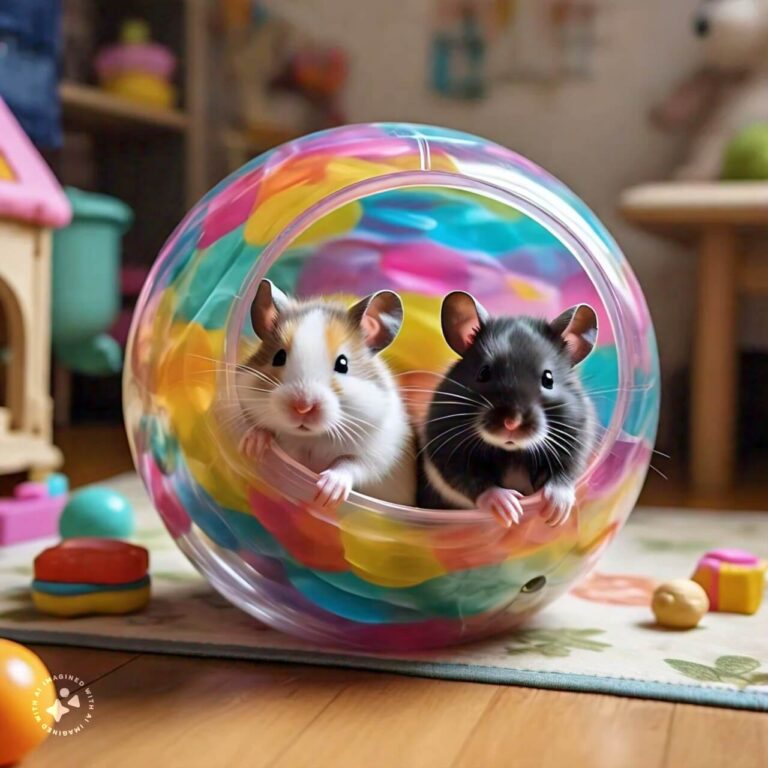Why Hamsters Are Bad Pets – Hamsters.pk
Nocturnal Nature: Hamsters’ Sleep Schedule Clashes with Owners
Hamsters are adorable and popular pets, but their nocturnal nature often comes as a surprise to new owners. Unlike humans, who are active during the day and sleep at night, hamsters follow a different rhythm. This can lead to a significant clash between the sleep schedules of hamsters and their owners, making them less than ideal pets for some individuals.
Understanding Hamsters’ Nocturnal Behavior
In the wild, hamsters are prey animals, and they have evolved to be most active during the night to avoid predators. This instinct remains strong even in domesticated hamsters. They spend most of the daylight hours sleeping and become active and energetic during the evening and nighttime.
Impact on Owner-Pet Interaction
The nocturnal nature of hamsters can significantly impact the bond between the pet and its owner. Many owners, especially those who work or study during the day, may find it challenging to interact with their hamsters when they are most active. Attempting to play with or handle a hamster during its natural sleeping hours can lead to a grumpy and irritable pet.
Potential for Sleep Disturbances
Hamsters’ nighttime activities can be disruptive to their owners’ sleep. These small pets often spend their waking hours running on their exercise wheel, gnawing on toys, or rearranging their bedding. The noise generated from these activities can be loud and persistent, especially if the hamster’s cage is located in or near the owner’s bedroom. This can result in sleepless nights and increased stress levels for the owner.
Considerations for Potential Hamster Owners
Before bringing a hamster home, it is crucial for potential owners to consider their lifestyle and sleep habits. Those who are light sleepers, have irregular work schedules, or prefer a pet that is active during the day may find hamsters to be incompatible with their needs. On the other hand, individuals who are night owls or have a separate room for their pet may find hamsters to be more suitable.
In conclusion, while hamsters can make cute and entertaining pets, their nocturnal nature can be a significant drawback for many owners. The clash between hamsters’ sleep schedules and their owners’ daily routines can lead to limited interaction, sleep disturbances, and increased stress. Potential hamster owners should carefully consider these factors before deciding to bring one of these small pets into their homes.
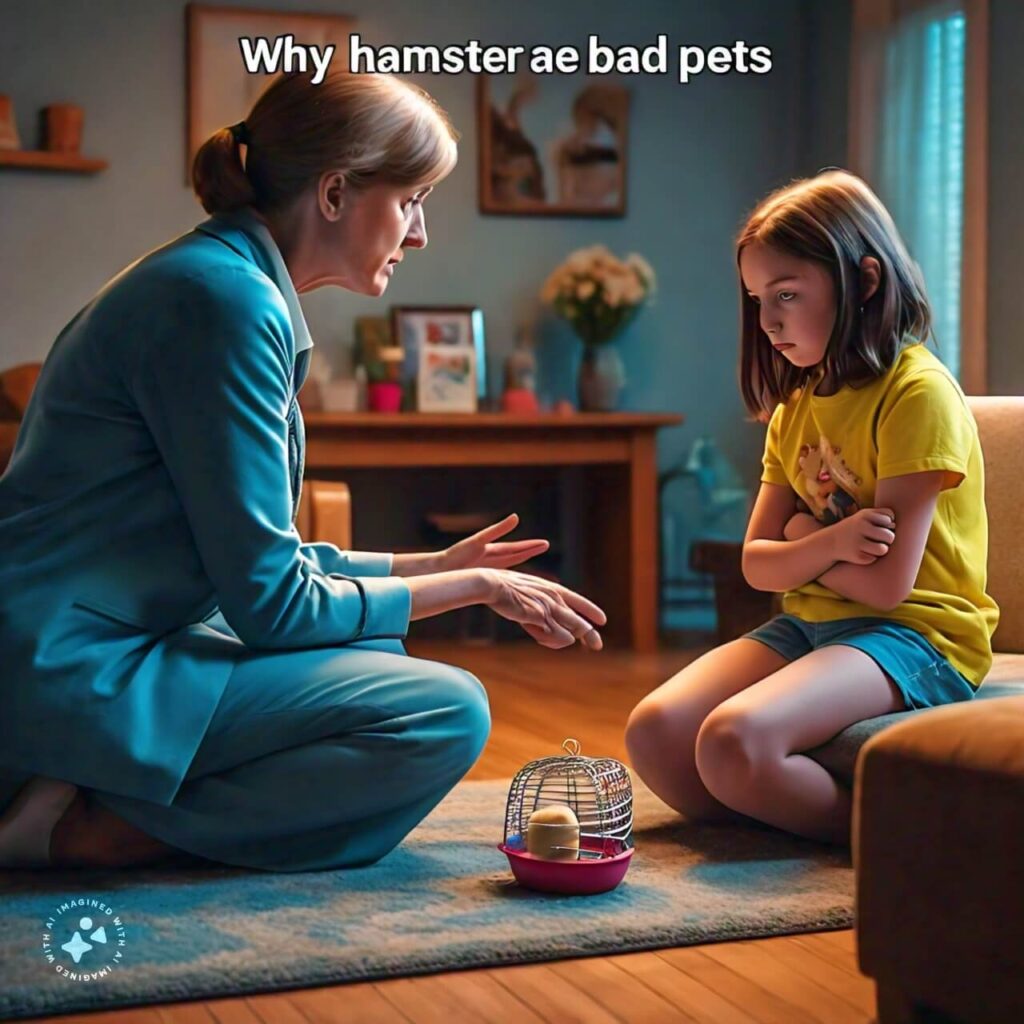
Fragile Health : Common Illnesses and Veterinary Challenges
Hamsters are delicate creatures that are prone to various health issues. Despite their small size, these pets require attentive care and regular veterinary check-ups to maintain their well-being. Neglecting their health can lead to serious illnesses and even premature death. In this article, we will discuss some of the most common health problems faced by hamsters and the veterinary challenges associated with their care.
Respiratory Infections
Hamsters are highly susceptible to respiratory infections, which can be caused by bacteria, viruses, or fungi. Symptoms of respiratory infections include sneezing, wheezing, difficulty breathing, and discharge from the nose or eyes. If left untreated, these infections can lead to pneumonia and become life-threatening. Prompt veterinary care and a course of antibiotics are usually necessary to treat respiratory infections in hamsters.
Digestive Issues
Hamsters have sensitive digestive systems and are prone to issues such as diarrhea, constipation, and wet tail. Wet tail is a particularly serious condition caused by stress or bacterial imbalances in the gut. It can lead to severe dehydration and can be fatal if not treated promptly. Other digestive problems can be caused by improper diet, sudden changes in food, or the ingestion of foreign objects. Providing a balanced diet, fresh water, and a clean habitat is crucial in preventing digestive issues in hamsters.
Dental Problems
Like many rodents, hamsters have continuously growing teeth that require regular wear to maintain proper length and alignment. If their teeth become overgrown or misaligned, it can lead to dental problems such as tooth root abscesses, difficulty eating, and even malnutrition. Regular veterinary check-ups and providing appropriate chew toys can help prevent dental issues in hamsters.
Skin Conditions
Hamsters can suffer from various skin conditions, including mites, ringworm, and dermatitis. These conditions can cause itching, hair loss, and skin irritation, leading to discomfort and stress for the pet. Some skin problems can be contagious to humans, so prompt veterinary treatment is essential. Maintaining a clean and hygienic habitat, as well as regular grooming, can help prevent skin issues in hamsters.
Veterinary Challenges
Treating health problems in hamsters can be challenging due to their small size and delicate nature. Many veterinarians may not have extensive experience with these exotic pets, making it difficult to find specialized care. Additionally, administering medication and performing surgical procedures on hamsters requires great skill and precision. Owners may need to seek out exotic animal veterinarians or travel long distances to find appropriate care for their pet.
In conclusion, while hamsters can make cute and entertaining pets, their fragile health and susceptibility to various illnesses can be a significant concern for owners. Common health problems such as respiratory infections, digestive issues, dental problems, and skin conditions require prompt veterinary attention and specialized care. Potential hamster owners should be prepared for the financial and emotional responsibilities associated with maintaining their pet’s health and well-being.
Solitary Lifestyle : Hamsters’ Antisocial Behavior and Aggression
Hamsters are often portrayed as friendly and sociable pets, but in reality, they are solitary animals with a strong preference for living alone. Their antisocial behavior and potential for aggression can come as a surprise to new hamster owners who may have expected a cuddly and interactive pet. Understanding the natural instincts and needs of these small rodents is crucial for providing them with a suitable living environment and avoiding unnecessary stress for both the pet and the owner.
The Solitary Nature of Hamsters
In the wild, hamsters are solitary creatures that inhabit individual burrows and only interact with others for mating purposes. This innate preference for solitude persists in domesticated hamsters, who thrive when provided with their own space and resources. Attempting to house multiple hamsters together, even littermates, can lead to territorial disputes, aggression, and severe injuries.
Territorial Behavior and Aggression
Hamsters are highly territorial animals that instinctively defend their space and resources from perceived threats. When hamsters feel that their territory is being invaded, they may display aggressive behaviors such as chasing, biting, and fighting. This aggression can be directed towards other hamsters, pets, or even their owners if they feel threatened or cornered.
Stress and Anxiety in Social Situations
Forcing hamsters into social situations, such as shared living spaces or playtime with other hamsters, can cause significant stress and anxiety. When hamsters are stressed, they may exhibit behaviors such as excessive grooming, bar-chewing, or attempts to escape their enclosure. Prolonged stress can lead to a weakened immune system, making the hamster more susceptible to illnesses and reducing their overall quality of life.
Providing Appropriate Living Conditions
To cater to hamsters’ solitary lifestyle and prevent aggression, it is essential to provide them with appropriate living conditions. Each hamster should have its own spacious cage or habitat, equipped with a secure hiding spot, plenty of bedding material, and separate food and water sources. Owners should avoid housing hamsters together or allowing them to interact with other pets to minimize the risk of territorial disputes and injuries.
Interacting with a Solitary Pet
While hamsters may not be the most social pets, they can still form bonds with their owners through gentle and respectful interaction. Owners should approach their hamsters calmly and allow them to initiate contact on their own terms. Providing a safe and enriching environment with plenty of toys and opportunities for exercise can help keep hamsters mentally stimulated and reduce the likelihood of aggression or stress-related behaviors.
In conclusion, hamsters’ solitary lifestyle and potential for antisocial behavior and aggression are essential factors to consider before bringing one home as a pet. By understanding their natural instincts and providing them with appropriate living conditions, owners can help their hamsters lead happy and healthy lives. However, those seeking a social and cuddly pet may find that hamsters are not the best fit for their lifestyle and expectations.
Short Lifespan : Emotional Toll of Frequent Losses on Pet Owners
Hamsters are popular pets, often chosen for their cute appearance and small size. However, one of the most significant drawbacks of owning a hamster is their short lifespan. On average, hamsters live only 2-3 years, which means that their owners may experience the heartbreak of losing their beloved pet multiple times over a relatively short period. This frequent cycle of loss can take a significant emotional toll on pet owners, making hamsters a challenging choice for those who become deeply attached to their animal companions.
The Bond Between Hamsters and Their Owners
Despite their small size and relatively short time spent with their owners, hamsters can form strong bonds with the people who care for them. Many hamster owners become deeply attached to their pets, investing time and emotion into providing them with a happy and healthy life. This bond can be just as strong as the connection formed with longer-lived pets, such as cats or dogs.
Coping with the Loss of a Beloved Pet
Losing a pet, regardless of its size or lifespan, can be a devastating experience. Hamster owners may experience grief, sadness, and a sense of emptiness after the death of their furry friend. The grieving process is a natural response to loss, and it is essential for owners to allow themselves time to process their emotions and come to terms with the absence of their pet.
The Emotional Impact of Frequent Losses
For hamster owners, the grief of losing a pet can be compounded by the knowledge that they may have to go through the same experience multiple times in a relatively short period. This recurring cycle of loss can be emotionally exhausting, leading to feelings of hopelessness, anxiety, or even reluctance to bond with future pets. Some owners may decide to take a break from pet ownership altogether to avoid the pain of repeated losses.
Cherishing the Time Spent Together
While the short lifespan of hamsters can be emotionally challenging for their owners, it is essential to focus on the quality of time spent together rather than the quantity. Hamster owners can make the most of their pet’s life by providing them with a loving home, a stimulating environment, and plenty of attention. By cherishing the moments shared with their hamster, owners can create meaningful memories that will last long after their pet has passed away.
Deciding if a Hamster is the Right Pet for You
Before bringing a hamster home, potential owners should carefully consider their emotional resilience and ability to cope with frequent losses. While some individuals may find the short lifespan of hamsters to be manageable, others may prefer pets with longer life expectancies to avoid the emotional toll of repeated grief. It is essential to be honest with oneself about the level of attachment and commitment one is willing to invest in a pet with a limited lifespan.
In conclusion, the short lifespan of hamsters can have a significant emotional impact on their owners. The frequent experience of loss can be mentally and emotionally draining, leading some owners to question their ability to cope with the recurring cycle of grief. However, by focusing on the quality of time spent with their pet and cherishing the memories created, hamster owners can find joy and meaning in the brief but precious companionship these small animals provide. Ultimately, the decision to bring a hamster into one’s life should be made with a clear understanding of the emotional challenges their short lifespan may present.





